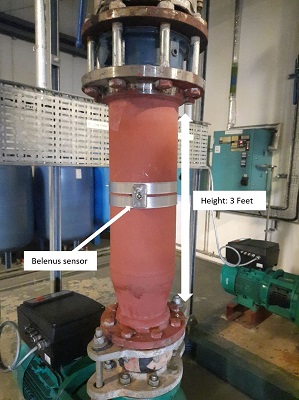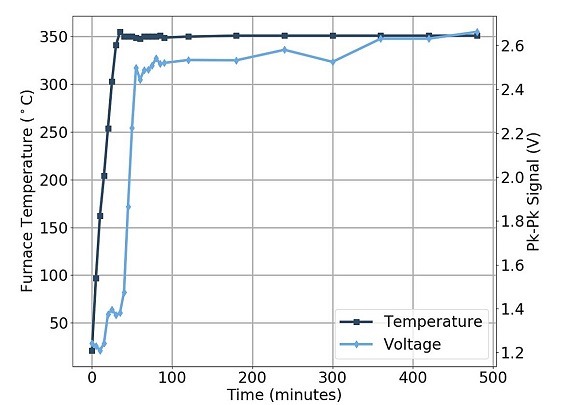A new ultrasound sensor developed by Novosound (Glasgow, Scotland) aims to provide corrosion monitoring across a variety of structures and diverse environments in a range of industries. Known as Belenus, the device was one of 10 winners of the 2021 Materials Performance (MP) Corrosion Innovation of the Year Awards program.
Manufactured using patented thin-film technology, the probe is described by the company as the world’s first corrosion monitoring sensor that can operate while completely soaked in high-temperature atmospheres of up to 752 °F (400 °C). Each small sensor, which works in those environments for extended periods of time, measures only 1.97 by 1.26 by 0.79 in (5.0 by 3.2 by 2.0 cm).
By providing real-time corrosion data from remote and inaccessible locations, the Belenus aims to enable power plant, refining, processing, and manufacturing facility owners and operators to detect corrosion early and reliably in metal pipework and structures. This can facilitate improved maintenance planning and increased operational efficiency, as corrosion issues can be actioned and mitigated before any unexpected failures.
“The current limitations of ultrasound probes can be traced back to the core rigid, ceramic sensor materials used in manufacturing,” says Claire Thring, application specialist with the U.K. company. “But by using our flexible, core thin-film material, the Belenus can conform to any surface curvature. Coupled with its compact size—roughly the size of a Zippo lighter, or car key fob—the sensor can be fitted to a range of structures including pipes, storage tanks, and pressure vessels, enabling permanent asset monitoring.”
 “This has countless benefits for customers, including potentially eliminating the requirement to shut down assets for inspections, as well as carry out readings,” Thring adds. Not only does this save companies time and money, but it also limits the number of occasions personnel are required to enter what can be dangerous environments.”
“This has countless benefits for customers, including potentially eliminating the requirement to shut down assets for inspections, as well as carry out readings,” Thring adds. Not only does this save companies time and money, but it also limits the number of occasions personnel are required to enter what can be dangerous environments.”
According to Dave Hughes, CEO and founder of the company in 2018, many conventional ultrasound sensors struggle to operate effectively when exposed to high temperatures and extreme conditions. By contrast, the Belenus is suitable for fixed installation in both extreme and ambient environments. By providing real-time, asset integrity data, it enables operators to proactively manage corrosion risk while making data-informed decisions and reducing overall operational costs.
“Power stations, oil refineries, and nuclear plants all contain pipes, which are subject to harsh environments, usually with high pressures and temperatures,” Hughes explains. “Due to the harsh environment, the pipes tend to corrode over time and lose wall thickness, which can lead to failure. In the interest of safety and to allow for timely and targeted maintenance, it is desirable to be able to monitor the condition of these pipes, preferably without costly equipment shutdown.”
The Belenus works by utilizing an ultrasonic pulse-echo to monitor pipe wall thickness. It generates an ultrasonic signal into the pipe, and the time taken for a reflection to be detected allows for the calculation and visual display of the pipe’s wall thickness on a data acquisition unit (Figure 1). A faster arrival time indicates that the pipe wall is thinning.
The utilization of a thin-film material means that the Belenus has no intrinsic Curie temperature, unlike many standard sensors, and it does not require welding, coolant, couplant, or delay lines. The flexible nature of the thin-film also allows for a simple compression fitting installation to any component shape, including small access areas and complex geometries such as challenging pipe elbow bends and branches—all while using just one type of sensor. The thin-film material is additively manufactured in-house, which makes it cost-effective and repeatable.
 Figure 2 shows a typical Belenus sensor, installed in a boiler. The entire sensor housing is 50 mm long, less than the size of a matchbox.
Figure 2 shows a typical Belenus sensor, installed in a boiler. The entire sensor housing is 50 mm long, less than the size of a matchbox.
While there is often limited room around an inspection pipe, which can be surrounded by multiple branch points, the compact size and flexibility of Novosound’s device allows for each probe to be easily installed—even in areas with tight working spaces and restricted access. Figure 3 shows a sample installation.
From a recent case study, Figure 4 shows the sensor’s signal strength doubling when heated to 350 °C. By contrast, many conventional sensors often display a weaker signal over time, Hughes explains. The sensors shown are part of a set of sensors installed in an operational boiler in the United Kingdom, which have been running since the summer of 2020. The boiler housing’s interior can exceed 400 °C, with high-pressure steam and water present.
 “The client now has access to thickness measurements at all times, as opposed to being only able to take manual readings at defined shutdowns,” Hughes says. “This allows for corrosion to be detected in pipes without the shutdown or cooling of assets, which greatly reduces maintenance costs and downtime. This also enhances safety, as it limits staff exposure to high temperatures and hazardous environments. Additionally, without the need for a delay line when operating at high temperatures, there is no loss of signal between the sensor face and asset.”
“The client now has access to thickness measurements at all times, as opposed to being only able to take manual readings at defined shutdowns,” Hughes says. “This allows for corrosion to be detected in pipes without the shutdown or cooling of assets, which greatly reduces maintenance costs and downtime. This also enhances safety, as it limits staff exposure to high temperatures and hazardous environments. Additionally, without the need for a delay line when operating at high temperatures, there is no loss of signal between the sensor face and asset.”
Based near Glasgow, Novosound’s ultrasound sensors are invented and produced in Scotland and have already attracted global clients in the oil and gas, energy, renewables, medicine, aerospace, and automotive markets. Its products are aimed to help the nondestructive testing industry thanks to their underlying technology, which helps test metal pipework and structures no matter the shape or size, or what temperature they are operated at.

Additional information on Novosound, as well as other winners from the 2021 Corrosion Innovation Awards program, can be found at the official web site. More winner profiles will be featured in MP’s print and digital platforms over the coming months.
Source: 2021 MP Corrosion Innovation of the Year Awards, mp-innovation-awards.webflow.io.